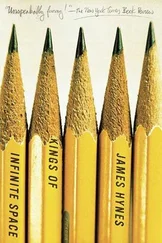Kevin salutes her with his bottle. “How can I say no?”
“Buckle up,” she says.
* * *
Rehydrated, air-conditioned, buckled in, Kevin rides comfortably up South Lamar in the well-padded cab of Dr. Barrientos’s powerful red pickup.
“I’m Kevin.” He reaches across the cab to offer her his hand.
“Claudia.” Her handshake is not particularly firm, which surprises him, because you’d think a surgeon, not to mention someone with her obvious upper-body strength, would have a grip like a C-clamp. But he reminds himself that he’s through making assumptions, for now, anyway. Inside the cab the guttural roar of the engine is a vibrationless purr; it’s like riding in a recording booth. Beyond the tinted windows smaller cars and the fast food joints fall quickly behind. Up ahead some blocky brown condos rise out of the green mass of trees, atop a low cliff of crumbling yellow stone. Across a brownish lawn below the cliff is a line of stout palm trees, with squat pineapple trunks and spiky crowns. An hour or so ago the sight of palm trees startled him, but now Kevin’s too lightheaded to feel amazement.
“So you exercise in this heat?” he says.
“That surprises you?”
Dr. Barrientos is a confident driver, to say the least, accelerating through a big intersection, crowding a yellow light that turns red as they pass under it. She guns the truck up the hill and under the lee of the bluff.
“Well, my experience in Texas so far pretty clearly shows that I can’t even walk around in it,” Kevin says. “And here you are, running.”
A glance from the doctor. “Where are you from exactly?”
“Michigan.”
“And you’re here for an interview, no?”
“Yeah,” drawls Kevin, like he’s not so sure any longer.
“Is the job a good one?”
“It had better be, if I have to get used to this heat.”
The doctor laughs, not much more than a snort. “This is nothing.”
Kevin watches her sidelong, past the edge of his sunglasses. She drives like a man, her legs spread casually, her right hand loose on the top of the steering wheel, the way his dad used to settle in on long drives. At the same time she’s reaching behind her with her left hand, elbow in the air, squeezing the headrest and flexing her biceps. The smell of her sweat is powerful, even in the arctic AC, but it’s not unpleasant. It even reminds Kevin of sex, and he lets his sidelong gaze linger on her sweat-glistening thigh. He wonders if what McNulty assumed about nurses goes for doctors as well.
“I grew up in the Valley,” she says, “where it gets even hotter than here.”
“The Valley?”
“Brownsville? McAllen?” She glances at him. “Down along the Rio Grande.”
She says “Rio Grande” like a Spanish speaker, with flowing R ’s and the E on the end. Rrrio Grrran-day.
“Laredo,” she says. “You’ve heard of Laredo, right?” Saying “Laredo” her tongue does something with the R that Kevin could never imitate.
“Sure.”
“Well, we never lived in Laredo. But it’s in the Valley.”
They sail effortlessly past an Austin city bus grinding up the hill. Lamar is five lanes wide here, but the canopy of trees hanging over either side of the street makes it feel narrow. Even the regular trees here look strange to Kevin, not just the palms. It’s the leaves, he decides, they’re smaller and sharper than the broad deciduous leaves of Michigan trees. Shinier, too, like green leather.
“So you were never out walking the streets of Laredo,” he says.
“Excuse me?” She looks at him as sharply as she did when he implied she was a nurse. Now she’s gripping the wheel with both hands. Oh hell, thinks Kevin, now she thinks I just called her a streetwalker. Maybe she noticed him checking her out and has decided she doesn’t like it. Keep Your Mouth Shut, he reminds himself. I should just get out and walk. But instead he starts singing.
“ ‘As I walked out on the streets of Laredo,’ ”—thank God for Grampa Quinn and his Sons of the Pioneers LPs—“ ‘as I walked out in Laredo one day…’ ” Kevin’s quavering rendition has none of his grandfather’s confident tenor — like his dad, Kevin’s more of a baritone, and he’s reaching for the high notes — and the padded upholstery of the truck muffles the music. But even so, it seems to have soothed Dr. Barrientos’s savage breast.
“Ah,” she says.
Kevin takes another gulp of water. With this woman, it’s always two steps forward, one step back. At the top of the hill ahead, a crowded strip-mall sign rises against the whitish sky. HEART OF TEXAS MUSIC says the top of the sign, with an electric guitar outlined in red neon. Phone and power lines cross and recross above the street like laces, slung between wooden telephone poles silhouetted against the glare. A haze blurs the signs and power lines and telephone poles ever so slightly, but it’s not humidity, it’s the light ricocheting off itself, glittering, fracturing. Even behind his sunglasses, even through the twilight tint of the doctor’s windows, it makes him squint. No wonder everybody here’s so testy.
“ ‘Beat the drum slowly,’ right?” she says, not quite smiling. She lifts her other hand to the headrest and starts squeezing and flexing. Kevin glimpses the blued shadow of stubble under her arm. He’s pierced with desire for her; he’d like to bury his nose in that armpit.
“My grandfather used to sing it.” He smiles at her. “Back where I come from, it’s all anyone knows of Texas.”
“ ‘The Streets of Laredo’? Really?” Her fingers press so deep into the leather of the headrest Kevin’s sure she’s going to puncture it. Her biceps throbs like a heart. He’s thinking that in bed she could clamp a man between her powerful thighs like a predator, and he’s wondering — in the vernacular of his old-school Polish uncle and his VFW buddies — if he’s even man enough for a woman like Dr. Barrientos.
“Well, you know. Cowboys. Cattle. Oil.” Lawless border towns, he nearly says. The Alamo, The Searchers. Docile, flat-faced Mexican peasants. Mariachi bands. Fiery, finger-snapping, hat-dancing señoritas.
“Chips and salsa,” he says instead.
“Chips and salsa.” She gives her little snorting laugh again and drapes both hands loosely over the wheel, just like his dad used to. That cools his ardor a bit. He can live with the idea that he might fall for a woman like his mother, but would he really fall for one like his dad?
“And Dubya,” Kevin says. “We blame Texans for that.”
Of course he shouldn’t have said that — what if she’s a Republican? A lot of them are, he knows — Bush-voting Hispanics, conservative Catholic Chicanos, who voted for Obama only because the rest of the Republican Party got so squirrelly about immigration. But to his relief, she gives him a heartfelt laugh, if a little grudging and melancholy. They sail under another yellow light, weaving between slower cars to the top of the hill, out from under the trees and into the glare again. Ahead is a little foreshortened forest of plainspoken signs — COLOR COPIES 69¢, SELF-STORAGE, SAXON PUB — punctuated by telephone poles.
“You can’t blame us for that,” she says. “He’s from Connecticut.”
“Ah, a Yankee. So it’s our fault.”
“A Norte Americano. ” She lifts one finger off the wheel. “You don’t get more norte than Connecticut.”
“Hey, I’m from Michigan, remember?” says Kevin. “I’m practically a Canadian.”
She smiles, still attractively melancholy. “Oh, Canadians are all right.” Her eyes seem distracted again.
Now they’re passing the slightly scruffy sort of local businesses that he’d find on the down-market end of Stadium Boulevard back home, out toward Ypsilanti: a Mexican restaurant in bright orange stucco; a Goodwill shop; another Mexican restaurant; a gas station and convenience store where unleaded regular is twenty cents cheaper than in Ann Arbor. The very pavement of Lamar looks scruffy, as leached of color as a faded pair of jeans. Behind these roadside establishments rise masses of trees, their leaves glittering in the nearly vertical sunlight, deep green in the mutually reinforcing tints of Kevin’s glasses and the windows of the truck. Who knew Austin was so leafy? But even at a distance the treetops still look strange, more like the bristling feathers of some prehistoric bird than leaves, and all this archaeopteryx foliage unsettles him even more. Strange trees; strange car; strange, distracted woman — Kevin feels the mild but distinct queasiness of being a passenger in a stranger’s vehicle. And not just a strange vehicle, but a fastidiously antiseptic one — even the cab he caught at the airport had more character than Dr. Barrientos’s truck. There’s no yin-yang medallion spinning from her rearview, no CDs in the pockets between the seats, no crumbs in the upholstery, not even any dust on the padded dash. Apart from her sweat, it doesn’t even have a smell apart from the clammy chill of the AC. But then she’s a surgeon. Perhaps she maintains a sterile environment even in her car.
Читать дальше












